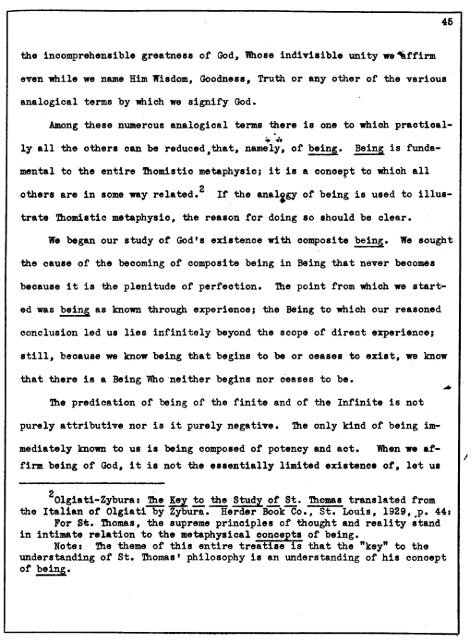Natural Knowledge of God in the Philosophy of Saint Thomas Aquina
You also want an ePaper? Increase the reach of your titles
YUMPU automatically turns print PDFs into web optimized ePapers that Google loves.
46<br />
<strong>the</strong> <strong>in</strong>comprehensible greatness <strong>of</strong> <strong>God</strong>. Whose <strong>in</strong>divisible unity we~ffirm<br />
even while we name Him Wisdom, Goodness. Truth or any o<strong>the</strong>r <strong>of</strong> <strong>the</strong> various<br />
analogical terms by which we signify <strong>God</strong>.<br />
Among <strong>the</strong>se numerous analogical terms <strong>the</strong>re is one to whioh practical-<br />
1y all <strong>the</strong> o<strong>the</strong>rs can be reduced,that, namely, <strong>of</strong> be<strong>in</strong>g.<br />
.<br />
... .. ;<br />
Be<strong>in</strong>g is fundamental<br />
to <strong>the</strong> entire Thomistic metaphysio; it i8 a oonoe~t to which all<br />
o<strong>the</strong>rs are <strong>in</strong> some way related. 2 If <strong>the</strong> analigy <strong>of</strong> be<strong>in</strong>g is used to illustrate<br />
Thomistic metaphysio, <strong>the</strong> reason for do<strong>in</strong>g so should be clear.<br />
We began our study <strong>of</strong> <strong>God</strong>'s existence with composite be<strong>in</strong>g. We sought<br />
<strong>the</strong> cause <strong>of</strong> <strong>the</strong> becom<strong>in</strong>g <strong>of</strong> composite be<strong>in</strong>g <strong>in</strong> Be<strong>in</strong>g that never becomes<br />
because it is <strong>the</strong> plenitude <strong>of</strong> perfection.<br />
The po<strong>in</strong>t from which we started<br />
was be<strong>in</strong>g as known through experience; <strong>the</strong> Be<strong>in</strong>g to which our reasoned<br />
conclusion led us lies <strong>in</strong>f<strong>in</strong>itely beyond <strong>the</strong> scope <strong>of</strong> direct experience;<br />
still, because we know be<strong>in</strong>g that beg<strong>in</strong>s to be or oeases to exist, we know<br />
that <strong>the</strong>re is a Be<strong>in</strong>g Whonei <strong>the</strong>r beg<strong>in</strong>s nor ceases to be.<br />
The predication <strong>of</strong> be<strong>in</strong>g <strong>of</strong> <strong>the</strong> f<strong>in</strong>ite and <strong>of</strong> <strong>the</strong> Inf<strong>in</strong>ite is not<br />
purely attributive nor is it purely negative.<br />
The only k<strong>in</strong>d <strong>of</strong> be<strong>in</strong>g immediately<br />
known to us is be<strong>in</strong>g composed <strong>of</strong> potency and aot.<br />
When we affi~<br />
be<strong>in</strong>g <strong>of</strong> <strong>God</strong>. it is not <strong>the</strong> essentially limited existence <strong>of</strong>. let u.<br />
I<br />
201giati-Zybura: ~ Key ~ ~ Study 2!!!. Thoma. translated from<br />
<strong>the</strong> Italian <strong>of</strong> Olgiati by Zybura. Herder Book Co., St. Louis, 1929,.p. 441<br />
For S •• <strong>Thomas</strong>, <strong>the</strong> supreme pr<strong>in</strong>ciples <strong>of</strong> thought and reality stand<br />
<strong>in</strong> <strong>in</strong>timate relation to <strong>the</strong> metaphysical concept. <strong>of</strong> be<strong>in</strong>g.<br />
Note: The <strong>the</strong>me <strong>of</strong> this entire treati.e is that <strong>the</strong> "key" to <strong>the</strong><br />
understand<strong>in</strong>g <strong>of</strong> St. <strong>Thomas</strong>' philosophy is an understand<strong>in</strong>g <strong>of</strong> his conoept<br />
<strong>of</strong> be<strong>in</strong>g.


















